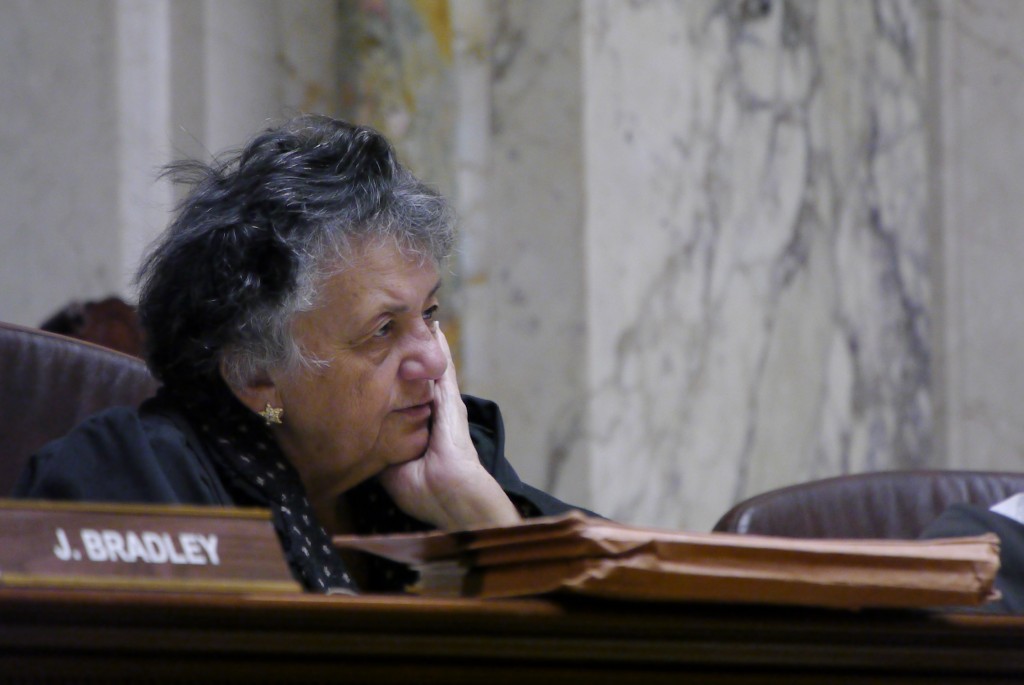Abrahamson Let the Sunshine In
For decades Justice Abrahamson was state Supreme Court’s foremost champion of open records.
As Justice Shirley Abrahamson ends her tenure on the Wisconsin Supreme Court, after 43 years and more than 1,300 authored opinions, she leaves a rich legacy of legal scholarship, importantly including her support for government transparency.
While on the court, Abrahamson faithfully applied the presumption in favor of public access in the open records and meetings laws. She authored or joined dozens of opinions affirming the law’s stated policy that “all persons are entitled to the greatest possible information regarding the affairs of government and the official acts” of government officers and employees.
For example, she wrote the majority opinion in Milwaukee Journal Sentinel v. City of Milwaukee, a 2012 ruling that barred records custodians from charging requesters for the cost to redact (black out) records. Not only were such charges prohibited by statute, Abrahamson said, but “increasing the costs of public records requests for a requester may inhibit access to public records and, in some instances, render the records inaccessible.”
Abrahamson’s opinions also recognized Wisconsin’s strong tradition of open government. In a 2010 case, she quipped, “If Wisconsin were not known as the Dairy State it could be known, and rightfully so, as the Sunshine State.”
The Legislature narrowed the court-created loophole a few years later.
Abrahamson also advocated for transparency within the Supreme Court itself. In 2012, she opposed its 4-3 decision to close some of the court’s rules and operations conferences to the public. In 2017, she was in the 5-2 minority that closed all such conferences.
In addition, Abrahamson can take some credit for the existence of the Wisconsin Freedom of Information Council, the statewide group on which I serve.
In 1977, a joint committee of the media and the State Bar was created to study openness in legal venues. The committee invited Abrahamson, then a newly appointed member of the state Supreme Court, as its inaugural speaker. Council founding member Dave Zweifel recalls her advising that if openness in Wisconsin was to be protected and improved, the press needed to become better organized and more proactive.
Soon after, Wisconsin news organizations began meetings that led to the council’s creation in October 1978. Its first major accomplishment was to work with the state Supreme Court to make Wisconsin one of the first states to allow cameras in the courtroom.
Says Zweifel, “I credit Shirley for being the catalyst [of] what became a new era for open government in Wisconsin and remains highly effective to this very day.”
Fittingly, Abrahamson spoke at the Council’s 30th anniversary event in 2009. She concluded her remarks with a quotation from U.S. Supreme Court Justice Louis Brandeis that “sunlight is said to be the best of disinfectants.”
As Abrahamson concludes her time on the bench, she might be known, and rightfully so, as the Sunshine Justice.
Your Right to Know is a monthly column distributed by the Wisconsin Freedom of Information Council (wisfoic.org), a group dedicated to open government. Christa Westerberg, an attorney at Pines Bach law firm in Madison, is the group’s co-vice president.
Your Right to Know
-
‘Open’ Records Often Missing Names
 Dec 2nd, 2025 by Bennet Goldstein
Dec 2nd, 2025 by Bennet Goldstein
-
Data Center Secrecy Is Unacceptable
 Nov 4th, 2025 by Tom Content
Nov 4th, 2025 by Tom Content
-
Costs Shouldn’t Be Used To Deter Records Requests
 Oct 6th, 2025 by Mark Treinen
Oct 6th, 2025 by Mark Treinen





















